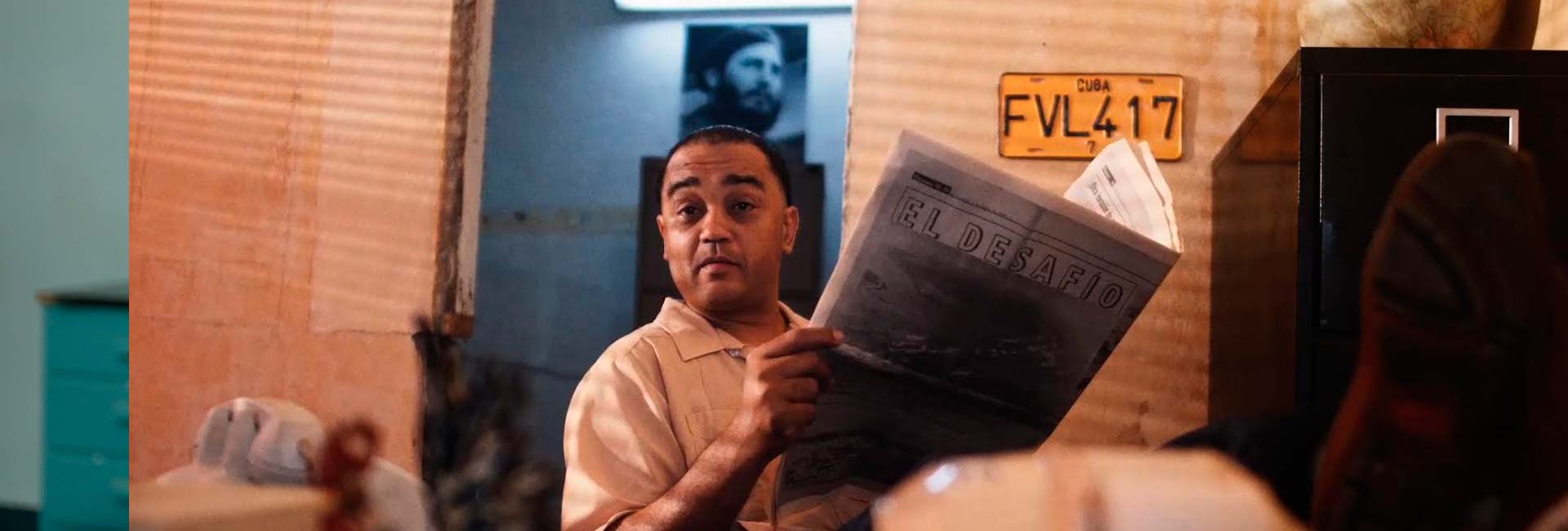

In an award-winning film, a UM student filmmaker shares his uncle’s story of escaping communist Cuba.
Tony Mendez sat fixated on his uncle’s storytelling as he told a comical yet serious account of his journey to the United States. From posing as a “pimp” to pretending to be a homosexual, Mendez’s uncle, Ricardo, tried everything he could to earn himself a criminal record in Cuba. A surefire way, Ricardo thought, to earn passage to America from Mariel, Cuba.
Though now comical, for Ricardo and many Cubans like him, these were acts of desperation to find a new life outside of the communist country.
Like many other Miamians, Mendez, an alumnus from the University of Miami’s School of Communication’s Department of Cinema and Interactive Media, has a direct lineage to Cuba. Both his father and mother were born and raised in Cuba before emigrating to Miami during the infamous Mariel boatlift in 1980. Ricardo’s journey was a little more complicated.
About the Photo
A still shot from UM School of Communication alumnus Tony Mendez's award-winning film, El Mar y Él (2015). Photo credit: Tony Mendez
Join the Conversation:
Follow on
Twitter:
UM School of Communication, @UM_SoC
University of
Miami, @univmiami
UM News, @univmiaminews
Little did Mendez know, his uncle’s journey would become the inspiration for his award-winning graduate thesis film, El Mar y Él, nominated for the 2015 Cannes Film Festival’s Short Film Corner award.
It was around the time he was looking for an idea for his film that Mendez attended a family gathering where his uncle told his full story. The story was so influential to Mendez that he recalled thinking “this is the movie; this needs to be told.”
To Mendez, his uncle’s journey represents more than just a story, it represents every Cuban’s struggle to escape the once free country they grew up in.
El Mar Y Él (2015) - Trailer from Tony Mendez on Vimeo.

Photo credit: Tony Mendez
“This was bigger than making a feature film. This was my family’s story, this was my uncle’s story, this was the story of 125,000 Cubans who had to go through a lot to get out of the country,” Mendez says.
The Mariel boatlift was a mass emigration of Cubans to the U.S. from April to October 1980. Fidel Castro opened the border to any Cuban wishing to leave the island from the Mariel harbor—about 25 miles west of Havana and the closest port to the U.S.—and many friends and relatives in the States sent over boats to transport the refugees to Miami or Key West. About 125,000 Cubans arrived at American shores in about 1,700 boats.
Mendez wanted to show that the majority of these Cubans were not criminals, but rather “average people trying to escape Cuba, and that was the driving force behind this movie.”
The majority of these migrants were ordinary Cubans with blue-collar skills. But, some were people released from Cuban jails and mental health facilities. When this was discovered, U.S. public opinion on granting asylum to the Cubans coming from Mariel changed and the perception of Marielitos had a tinge of all the refugees being criminals or insane, or both. In reality, only about two percent, or about 2,700 of the 125,000 Cuban refugees were deemed violent or serious criminals under U.S. law.

Photo credit: Tony Mendez
Led by Mendez’s passion to show the reality of Cubans’ struggle to escape Cuba, El Mar y Él went on to win Best Thesis Film, Best Directing, Best Producing, Best Editing and Best Actor at the 2015 Canes Film Festival.
The festival, which is put on by the Department of Cinema and Interactive Media, reviews films from both undergraduate and graduate students enrolled in the Motion Pictures Program. The films are juried by a panel of film and television industry professionals.
El Mar y Él would also be voted as one of the top five best student films in 2015 and was screened at the 10th Annual Canes Film Showcase in Los Angeles at the Directors Guild of America Theater One.
After graduation, Mendez used the film’s success to catapult his career and work with the likes of National Geographic and CBS. Mendez started his own company, Wonder Worker Films, and a film festival called “Say it Loud” in Baltimore, Maryland, where he currently lives.
The film was also picked up by HBO Latin America for a two-year contract. Looking back on the film’s success, Mendez says, “It has been my greatest accomplishment so far.”
Mendez hopes that he can use his films to help influence change in race relations around the country and the world.
- ANDRES TAMAYO/ UM News
